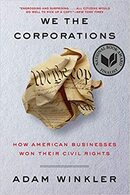Corporations vs. The People Our March 1 discussion centered around the 2019 book We The Corporations, by Adam Winkler. The essential theme of the book is that over the years corporations gradually have gained more and more constitutional rights, and therefore greater power, posing a significant challenge to our democracy. Corporations were originally stockholder monopolies granted exclusive rights by governments for specific public interest purposes. For example, the 13 colonies began as corporations. The corporations were authorized and regulated by charters that defined their scope and purpose and could be revoked if the corporation violated their terms. Business corporations, such as banks and insurance companies were rare. A corporation was considered a legal entity or “artificial person,” but not with the same rights as individuals: they only had the right to own property and enter into contracts. In 1819, in the landmark case of Dartmouth College v. Woodword, the US Supreme Court ruled that states were prohibited from changing the charters of corporations, even when they purported to do so for the public good. After that, private corporations multiplied as investors gained greater confidence that corporate charters could not be revoked or altered by the government. The 14th Amendment to the US Constitution (1868) was intended to give equal rights to newly freed slaves, but its provision that states cannot “deprive any person of life, liberty, or property, without due process of law” was successfully claimed by corporations to give them rights equal to individuals. In the early 20th century, the Supreme Court held that the due process clause incorporated the principle of “liberty of contract,” which authorized courts to strike down a number of laws designed to protect workers on the theory that a statute couldn’t interfere with the right of workers and employers to enter into contracts, even though the bargaining power between the two were highly unequal. Nonetheless, even the pro-business Supreme Court of the early 20th century distinguished between liberty rights and property rights, and held that corporations only had the latter. On that basis, the court concluded that corporations had no right to participate in politics, and upheld the Tillman Act enacted 1907, which prohibited corporations from contributing to candidates or political campaigns. In 1916, in Dodge Brothers v Ford Motor Company, the Michigan Supreme Court held that the corporation’s primary duty is to its shareholders, and it was unlawful for the Ford Motor Company to withhold shareholder dividends for the sake of objectives unrelated to increasing corporate profit, such as maintaining a reserve fund for workers in case of a downturn. In 1976, the court in Buckley v. Valeo declared that money is speech, and that the only valid restrictions on campaign contribution and spending are those that prevent corruption. In 1978, in First National Bank of Boston. v. Bellotti (1978) the court struck down a law that prohibited corporations from contributing to campaigns related to certain ballot initiative, based on the theory that such contributions promoted the free flow of information protected by the First Amendment. In the infamous Citizens United case of 2010 and subsequent cases, the Supreme Court struck down laws limiting donations of corporations to “independent” groups that try to influence elections. Donations were described by the court as “free speech,” and “corruption” was defined narrowly to include only quid pro quo contributions. Of course in reality there are no such independent groups, so this decision allowed almost unlimited corporate influence in elections. This ruling has led to huge increases in political spending groups trying to influence elections, growing corporate influence over politicians, and worsening economic inequality. Nonetheless, there are a number of indications that some corporations are interested in promoting the public good. In 2019, the Business Roundtable issued a statement that that the “purpose of a corporation” should be not only to advance the interest of its stockholders, but to invest in their employees, protect the environment, and deal fairly and ethically with other companies with which they interact. General Motors has pledged to stop manufacturing cars that run on gasoline within 15 years. In light of the recent events on January 6, a number of large corporations that see themselves as advocating corporate responsibility have pledged not to back politicians who voted to overturn the election results. Will corporate responsibility balance — or even exceed — corporate greed at some point? We will have to wait and see. Your comments and thoughts always are welcome. Also, don’t forget to look at our blog site renewingdemocracy.org Please recommend this newsletter to people who you think might appreciate it. If you want to be added to the list to receive each new newsletter when posted, fill out our contact form and check the box just above the SUBMIT button. You may also use that form to be removed from our list.
Visit our Books page for information about purchasing The Future of Democracy, The Death of Democracy, and Truth & Democracy. Click ↓ (#) Comments below to view comments/questions or add yours. Click Reply below to respond to an existing comment.
0 Comments
Your comment will be posted after it is approved.
Leave a Reply. |
 5th edition now available 5th edition now available
Steve ZolnoSteve Zolno is the author of the book The Future of Democracy and several related titles. He graduated from Shimer College with a Bachelor’s Degree in Social Sciences and holds a Master’s in Educational Psychology from Sonoma State University. He is a Management and Educational Consultant in the San Francisco Bay Area and has been conducting seminars on democracy since 2006. Archives
July 2024
Categories |
 RSS Feed
RSS Feed